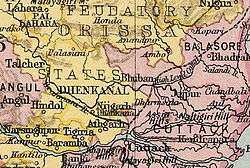Tigiria State
| Tigiria State ତିଗିରିଆ | |||||
| Princely State of British India | |||||
| |||||
 | |||||
| Government | Monarchy | ||||
| King | |||||
| • | 1682 - 1742 | Sankaraswar Mandhata | |||
| • | 1743 - 17.. | Gopinath Chamupati Singh | |||
| • | 17.. - 1793 | Jadumani Rai Singh | |||
| • | 1797 - 1844 | Jagannath Chamupati Singh | |||
| • | 1886 - 1933 | Harihar Kshatriya Birbar (b. 1826 - d. 1886) Chamupati Singh | |||
| • | 1886 - 1933 | Banamali Kshatriya Birbar (b. 1857 - d. 19..) Chamupati Singh | |||
| Historical era | British Colonisation of India | ||||
| • | Established | 16th century | |||
| • | Accession to the Union of India | 1948 | |||
| Area | |||||
| • | 1931 | 119 km2 (46 sq mi) | |||
| Population | |||||
| • | 1931 | 24,822 | |||
| Density | 208.6 /km2 (540.2 /sq mi) | ||||
| Today part of | Odisha, | ||||
| | |||||
Tigiria State (Odia: ତିଗିରିଆ), also known as Tigiria Nizigarh, was one of the princely states of India during the period of the British Raj. It was located in present-day Tigiria block of Cuttack district, Odisha. Although it was the smallest of the states of the Orissa States Agency it was the most densely populated.[1] The last ruler of Tigiria joined the state to the Indian Union in 1948.[2]
The state was bound in the north by Dhenkanal State, in the east it was bound by Athgarh State, in the south by the Mahanadi River and in the west by Baramba State.[1]
History
Tigiria was founded at an uncertain date in the sixteenth century by a ruler named Nityānanda Tunga. According to legend he was directed to the place by means of a dream while coming from the west on a pilgrimage to Puri.
The rulers of Tigiria Princely State gave importance to education and built and maintained a network of schools. The last Raja signed the accession to the Indian Union on 1 January 1948.[2]
The name 'Tigiria' most likely originated in the Sanskrit Trigiri, meaning "Three Hills". Most of the inhabitants of Tigiria were Hindu, members of the Chasa caste, and important places of worship were located within the area of Tigiria State.[3]
Rulers
Rulers of Tigiria bore the title Raja.[4]
- 1682 - 1742 Sankaraswar Mandhata
- 1743 - 17.. Gopinath Chamupati Singh
- 17.. - 1793 Jadumani Rai Singh
- 1797 - 1844 Jagannath Chamupati Singh
- 1844 - 8 Apr 1886 Harihar Kshatriya Birbar (b. 1826 - d. 1886) Chamupati Singh
- 8 Apr 1886 - 1933 Banamali Kshatriya Birbar (b. 1857 - d. 19..) Chamupati Singh
- 1933 - 1943 Sudarshan Kshatriya Birbar (d. 1943) Chamupati Singh
- 1943 - 15 Aug 1947 Brajraj Kshatriya Birbar (b. 1921 - d. 2015) Chamupati Singh Mahapatra[5]
See also
References
- 1 2 Imperial Gazetteer of India, v. 23, p. 357.
- 1 2 Tigiria Princely State - "The Golden Book of India"; LETHBRIDGE, Roper, MacMillan & Co., 1893 p. 539
- ↑ Temples in in Tigiria
- ↑ Princely States of India K-W
- ↑ Mohanty, Debabrata (1 December 2015). "Erstwhile king of Tigiria Brajraj Mahapatra dies in Odisha". The Indian Express.
Coordinates: 20°29′N 85°31′E / 20.483°N 85.517°E